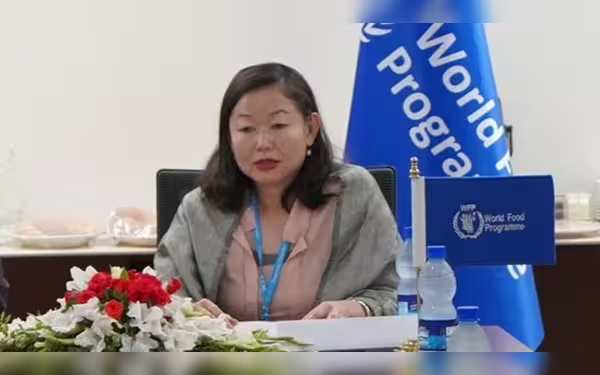Saturday, December 21, 2024 04:08 PM
WFP Collaborates with Pakistan to Enhance Food Security
- WFP launches meal initiative to combat food insecurity.
- Benazir Nashonuma Programme aims to prevent child stunting.
- School meal programs boost health and education in Balochistan.
 Image Credits: dailypakistanen
Image Credits: dailypakistanenWFP partners with Pakistan to improve access to nutritious food, combat food insecurity, and enhance child health through innovative programs.
In a significant move to combat food insecurity in Pakistan, the World Food Programme (WFP) has launched a new meal initiative aimed at ensuring access to safe and nutritious food for all citizens. This initiative comes at a time when the country faces critical challenges related to food accessibility and affordability, particularly in rural and underserved areas. The WFP is committed to addressing these issues, recognizing that access to affordable and nutritious food is a fundamental right that must be upheld for every individual.
WFP Country Director Ms. Coco Ushiyama emphasized the organization’s ongoing efforts to improve food access, highlighting the importance of partnerships with organizations such as the Food and Agriculture Organisation (FAO) and the International Fund for Agricultural Development (IFAD). These collaborations are designed to work on both policy and community levels, promoting food security, strengthening social protection systems, and enhancing nutrition across the nation.
At the community level, the WFP is actively engaging with local governments to ensure that people have access to safe and nutritious food. One of the flagship initiatives under this program is the Benazir Nashonuma Programme, which aims to prevent stunting among children. This nationwide program combines health and nutrition services to support mothers and children, particularly those under two years old. The positive results from this initiative have shown a marked improvement in nutritional outcomes, which is crucial for the healthy development of young children.
Moreover, the WFP is also involved in school meal programs, with a recent initiative launched in Balochistan that provides locally sourced, nutritious meals to schoolchildren. This program not only boosts the health of students but also encourages school attendance, which is vital for long-term educational and human capital development. With decades of experience in implementing school meal programs across over 100 countries, the WFP has demonstrated proven success in increasing school retention, attendance, and academic performance.
Ms. Ushiyama pointed out that these efforts extend beyond education. Better health and nutrition directly enhance a child’s ability to focus and succeed in their studies. In some regions, the WFP’s school meal programs also support local farmers by sourcing food locally, thereby contributing to the local economy and promoting sustainable agricultural practices.
The WFP’s initiative to improve access to affordable and nutritious food in Pakistan is a commendable step towards addressing the pressing issue of food insecurity. By focusing on community engagement, partnerships, and innovative programs, the WFP is not only working to enhance the nutritional status of the population but also fostering a healthier, more educated future generation. As these initiatives unfold, it is essential for all stakeholders, including the government, local communities, and international organizations, to collaborate and ensure that every individual has the right to safe and nutritious food.













